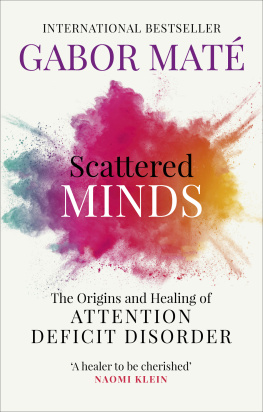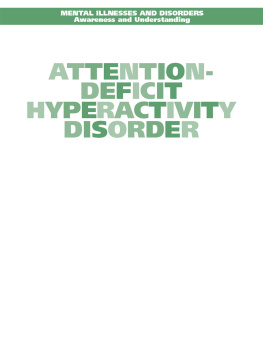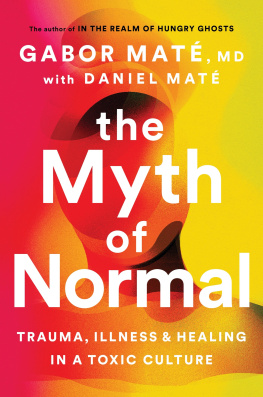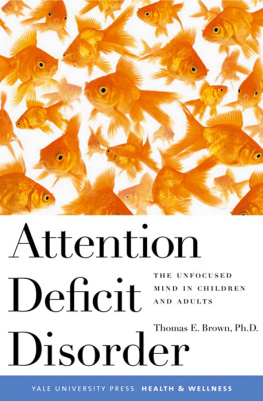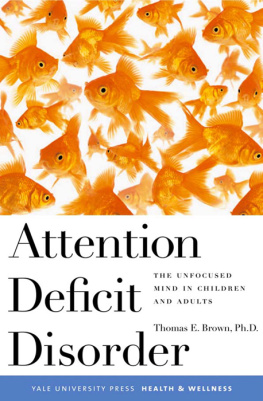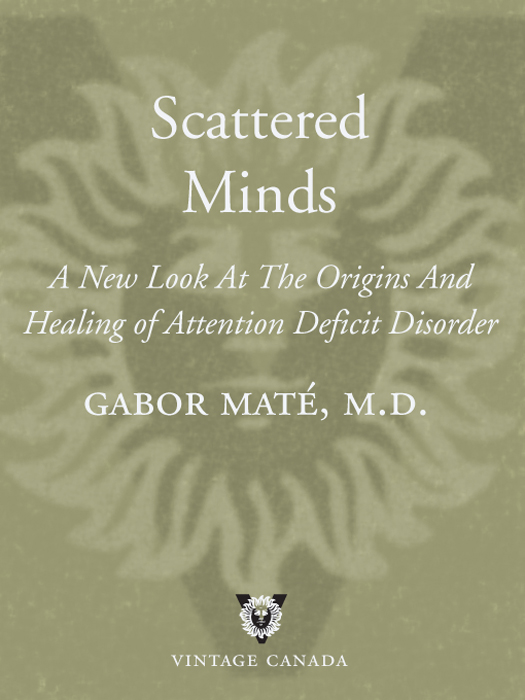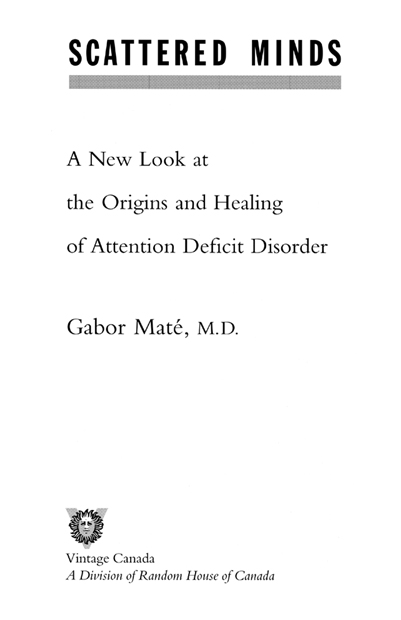Praise for Scattered Minds
[Gabor Mat] challenges the standard view of ADD [and] asks questions that deserve to be considered about a debilitating disorder and the kind of society in which it flourishes.
Macleans
Enlightening and sensitively told [with] a much needed focus on adults and adolescents with ADHD . For someone who is wondering if their own lack of attention, impulsiveness, distractibility, or hyperactivity may be ADHD , this would be a good read.
Winnipeg Free Press
Scattered Minds comes across as a caring, sympathetic, supportive, and helpful introduction to the topic. It also benefits from being an extremely well-written and engaging read.
The Georgia Straight
This book will be equally at home on the physicians bookshelf [and] in the home.
The County Chronicle
Scattered Minds [is] necessary reading for anyone who lives with the effects of ADD , in himself or in others; its an encouraging and reassuring approach.
The Chronicle-Journal (Thunder Bay)
This delightful, helpful book is a welcome addition to the literature on ADD . Based on solid research and a strong humanistic sensibility, it is written with humour and compassion, from an unsparingly honest personal perspective, I would enthusiastically recommend Scattered Minds to anyone touched by ADD adults, parents, and professionals.
Dr. John Ratey, co-author, Driven to Distraction and Shadow Syndromes
VINTAGE CANADA EDITION, 2000
Copyright 1999 by Gabor Mat
All rights reserved under International and Pan-American Copyright Conventions. Published in Canada by Vintage Canada, a division of Random House of Canada Limited, in 2000. First published in hardcover in Canada by Alfred A. Knopf Canada, Toronto, in 1999. Distributed by Random House of Canada Limited, Toronto.
Canadian Cataloguing in Publication Data
Mat, Gabor
Scattered minds : a new look at the origins and healing of attention deficit disorder
eISBN: 978-0-307-37469-1
1. Attention-deficit hyperactivity disorder Popular works. 2. Attention-deficit disorder in adults. 3. Mat, Gabor Mental health. 4. Attention-deficit hyperactivity disorder Patients Canada Biography. I. Title.
RJ506.H9M37 1999a 616.8589 C99-931480-7
v3.1
For my mother, Judith (Lvi) Mat, and for my late father, Andor Mat,
and for my own family, Rae, Daniel, Aaron and Hannah
Action has meaning only in relationship and
without understanding relationship, action on any level
will only breed conflict. The understanding of
relationship is infinitely more important
than the search for any plan of action.
J . KRISHNAMURTI
Contents
12 Stories within Stories:
ADD and the Family (III)
13 This Most Frenetic of Cultures:
The Social Roots of ADD
14 Severed Thoughts and Flibbertigibbets:
Distractibility and Tuning Out
15 The Pendulum Swings:
Hyperactivity, Lethargy and Shame
16 It Aint Over Till Its Over:
Unconditional Positive Regard
22 My Marshmallow Caught Fire:
Motivation and Autonomy
23 Trusting the Child, Trusting Oneself:
ADD in the Classroom
27 Remembering What Didnt Happen:
The ADD Relationship
28 Moses Saved by the Angel:
Self-Parenting (I)
29 The Physical and Spiritual Environment:
Self-Parenting (II)
30 In Place of Tears and Sorrow:
Addictions and the ADD Brain
31 I Never Saw the Trees:
What Medications Can and Cannot Do
Acknowledgments
I owe thanks to all of the following.
Dr. John Ratey gave friendly encouragement, and his frank critique of my first draft was bracing and salutary. He also helped keep me abreast of current neuroscientific findings.
The intellectual debt I owe to Dr. Alan Schore and Dr. Daniel J. Siegel will be evident to readers of this book. I was fortunate to attend their lectures on infant-parent relationships and brain development in Seattle in 1996. Their forward-looking work gave substance to my own intuitive views and helped ground them in the literature of brain research and neuropsychology.
Diane Martin at Knopf Canada has made an indispensable contribution to the completion of this manuscript. She has spared the reader much unnecessary eyestrain. I came to look forward to reading her astute commentary and to positively enjoy cutting when she said cut, changing when she said change. I cannot imagine receiving more sensitive and sensible editorial advice.
Deborah Brody at Dutton in New York saw the possibilities in this work right from the beginning and has maintained a clear vision of the direction it needed to take. I had feared working with two editors would be a chore. It turned out to be a pleasure.
Denise Bukowski shaped a long and unwieldy book proposal into publisher-friendly form.
Copyeditor Alison Reids expert and attentive work greatly enhanced the flow of the text without in any way detracting from its meaning.
My sister-in-law Noni Mat was the first to read the original several opening chapters. Her criticism was invaluable. Murray Kennedy also gave helpful feedback.
Dr. Michael Hayden gave his time and expertise to help clarify my understanding of genetics.
Betsy-Jo Spicer serendipitously started it all by inviting me to hear her story. Trish Crawford steered me in the right direction to find the neuroscientific research on brain development. Many adults with ADD and parents of ADD children have taught me by candidly sharing with me the stories of their lives.
I am grateful to four people whom I consider my teachers: the psychotherapist Andrew Feldmar, the developmental psychologist Dr. Gordon Neufeld, the psychiatrist Dr. Margaret Weiss and the family therapist Dr. David Freeman. The influence of all four is in these pages.
My friend Maria Oliverio, R.N ., kept my office going through my successive absences as I wrote Scattered Minds and, more remarkably yet, manages to keep it organized even when I am there.
Rae, my life partner and soulmate, has shared the years of struggle, sorrow, laughter, learning and love that went into creating much of the raw material for this book. She has also worked as my most stringent editor: time and time again her insightful comments helped me get closer to the heart of what I was trying to say. Without her loving support, this book could not have become a reality.
Finally, I must express my gratitude toward my three children, Daniel, Aaron and Hannah, who have taught me more perhaps than they should have had to, and who have warmly supported the realization of my long-time desire to become an author.
Authors Note


